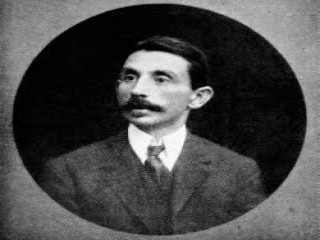
Euclides Da Cunha biography
Date of birth : 1866-01-20
Date of death : 1909-08-15
Birthplace : Rio de Janeiro, Brazil
Nationality : Brazilian
Category : Famous Figures
Last modified : 2011-04-21
Credited as : Writer, Os sertoes ,
Euclides Rodrigues Pimenta da Cunha was a Brazilian writer whose account of the clash between the Brazilian army and fanatic followers of a backwoods mystic became a national classic.
Euclides da Cunha was born in the province of Rio de Janeiro on Jan. 20, 1866. Orphaned at the age of 3, he was raised by aunts, interned in various boarding schools, and shuffled around a great deal. He was always moody, reserved, lonely, and unpredictable. At 18 he enrolled in the military academy, where he specialized in military engineering. Two years later he apparently suffered a nervous breakdown that led to a court-martial and dismissal for insubordination, but he was reinstated. The incident may already have reflected an abhorrence for war. In 1896 he resigned from the army as a first lieutenant and subsequently took up civil engineering while writing occasional newspaper articles.
When, in 1897, the army was forced to dispatch a fifth expedition into the backlands to crush a small messianic cult, Cunha accompanied the troops as a war correspondent for a leading Brazilian newspaper. Fighting in the searing heat of the drought-stricken region of northeast Brazil, the army proceeded to systematically exterminate the last of the sectarians, partially because they refused to surrender. Cunha not only wrote the commissioned articles but gathered the material for his broadly conceived, great book. In the next 5 years he directed engineering works by day and wrote at night. The result was Os sertoes (1902), translated as Rebellion in the Backlands.
Because of its vivid portrayal of the agony and bitterness of warfare, its anticipation of the technique of the documentary novel, its philosophical insights, and its perceptive interpretation of Brazil, the book was an immediate success. In it Cunha probed Brazil's developmental problems and drew attention to the misery and ignorance that still characterize Brazil's interior. Although he was grudgingly persuaded by the then current "scientific" ideas on racial superiority, his social Darwinism was tempered with admiration for the mestizos, who had been so brutally treated by the allegedly more civilized representatives of the coastal cities. In some ways it was an antimilitary tract, certainly a denunciation of man's inhumanity. At the same time, the book portrayed flesh-and-blood men caught up in a drama that moved inevitably to a tragic conclusion.
Cunha subsequently wrote several less important historical, biographical, geographical, and anthropological pieces, several of them dealing with the Amazon. A dispute over a woman led to his assassination at the age of 43 on Aug. 15, 1909.
















